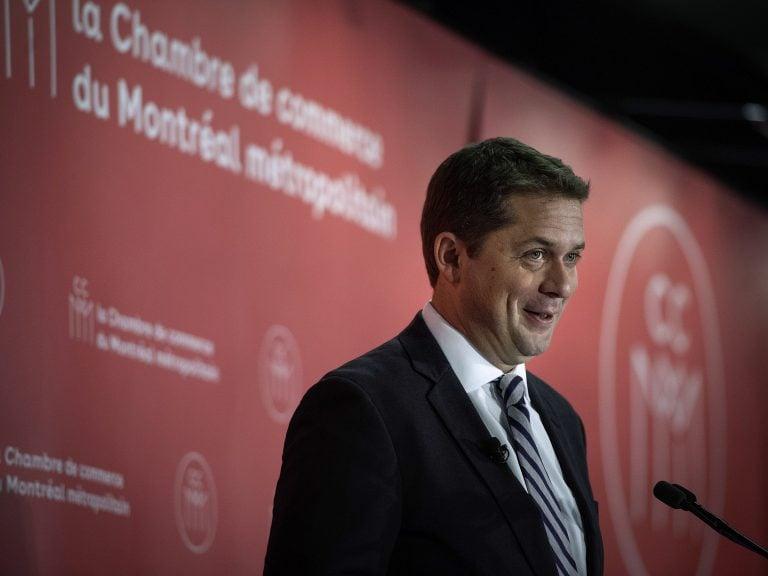Election 2019 campaign watch: And then there were two
Politics Insider for Sept. 10: Getting a campaign head start, Manitoba election watch and May on reopening the abortion debate

Leader of the Conservative Party Andrew Scheer speaks to members of the Chambre de commerce du Montreal metropolitain during a luncheon in Montreal on Friday, Sept. 6, 2019. (Peter McCabe/CP)
Share
Welcome to a sneak peek of the Maclean’s Politics Insider newsletter. Sign-up at the bottom of the page to get it delivered straight to your inbox.
And they’re off, sort of: The NDP was the first major party to officially kick off its 2019 election campaign Sunday, even if the party is deep in the red and still well short of a full slate of candidates. On the other hand under Jagmeet Singh the party has finally stepped into the digital age by outfitting canvassers with an online tool called Dandelion to keep tabs on prospective supporters and allowing front line volunteers to do away with their old paper spreadsheets and clipboards.
It’s the Conservatives’ turn tomorrow, when Andrew Scheer launches his bid to become prime minister by stopping first in Quebec before making his way to Ontario, two provinces shaping up to be key battlegrounds ahead of the Oct. 21 election. On social media Scheer’s campaign launch may find itself fighting for attention with an anti-Scheer meme that was the top trending hashtag on Twitter all day Monday — #ScheerWasSoPoorThat took off after the Conservative’s posted a quote from Scheer talking about his humble roots and thousands of Twitter users, including at least one Liberal MP, mocked him for it.
Well, Justin Trudeau did warn it would be a “nasty” campaign.
Like millions of Canadians, I grew up middle class. When Trudeau’s Liberal MPs mock me for that, they mock you too. pic.twitter.com/D5aCiA9tOm
— Andrew Scheer (@AndrewScheer) September 9, 2019
The Liberal campaign won’t officially launch until Trudeau advises Governor General Julie Payette to dissolve Parliament
Doer or die: It’s election day in Manitoba, after a campaign heavy on scripted clichés. Jason Markusoff looks at the key battle between Premier Brian Pallister and Wab Kinew, the leader of the NDP, and the careful line Kinew has tried to walk in recent weeks:
To expect Kinew to bring revolution to his province’s politics would be to misread what Manitobans typically want—gentler, more incremental politics of the type former three-term NDPer Gary Doer brought two decades ago. This is the centrism Kinew is trying to emulate with his simplistic mantra about “fixing health care” and his constant refrain about making life affordable. (It’s the same impulse that has made Pallister use nuance to create distance between himself and the more fervently Conservative types like Jason Kenney and Doug Ford.) In a break with most other NDP branches across Canada—and at odds with the Trudeau Liberals’ policy—Kinew’s New Democrats have promised to apply only a $20-per-tonne carbon tax and to not raise it; to somehow persuade Trudeau to accept that instead of his own policy of gradually hiking the rate to $50 (even though Trudeau already rejected Pallister’s static $25 charge.) The NDP leader tells Maclean’s many Manitobans would reject ramping up the levy as unaffordable, putting his position to the right of Dougald Lamont and his Manitoba Liberals, who will scrap it out with Kinew’s party for some Winnipeg seats. (Maclean’s)
‘What she meant to say was…’: It’s becoming a thing for politicians to make a declaration about abortion only to have their party scramble to clarify their statements. It was the Conservatives last month. Then on Monday Green Party leader Elizabeth May told CBC she would not ban any of her MPs from reopening the abortion debate despite her own pro-choice stance. “I could talk to them. I could try to dissuade them. I could say it would be unfortunate,” she said. “But I don’t have the power as leader of the Green Party to whip votes, nor do I have the power to silence an MP.” Hours later a spokesperson for the party said “there is zero chance” a Green MP would ever reopen the debate. (CBC News)
May was also uncharacteristically open in her interview about her religious views — when asked who her personal hero is, she said “Jesus Christ. Sorry. That’s my answer,” before observing that that Canadian politicians “should not put their religion on their sleeve … We are an inclusive and all embracing society. Within the Green Party, we have candidates from every faith and religion and a lot who don’t believe there is a God and wonder why anyone would be so foolish as to think so. And everyone is respected and welcome.”
When asked who her personal hero is, @ElizabethMay tells @VassyKapelos: “Jesus Christ. Sorry. That’s my answer.” #cdnpoli pic.twitter.com/TskcgnlTUq
— Power & Politics (@PnPCBC) September 9, 2019
Priorities: The Assembly of First Nations spelled out its election hopes Monday, and while Chief Perry Bellegarde refused to endorse anyone, he reminded the parties that Indigenous voters will have an impact on the outcome of the election. Atop the AFN’s wish list: that the incoming government work with First Nations to make mitigating the effects of climate change a national priority, while he also urged “sweeping change” to deal with the overrepresentation of Indigenous peoples in the criminal-justice system. (Canadian Press)